Mark Twain and Philosophy
Great Authors and Philosophy
General Editor: Jacob Held,
editor of Dr. Seuss and Philosophy
The Great Authors and Philosophy series is for anyone who ever wondered about the deeper ideas in their favorite authors books. Comprising entertaining, concise, and accessible takes on the philosophical ideas that classic and contemporary authors and their work convey, the books in this series bring together philosophical perspectives enhanced and illuminated by beloved stories from our culture.
Current Titles in the Series
Mark Twain and Philosophy , edited by Alan Goldman
Jane Austen and Philosophy , edited by Mimi Marinucci
Stephen King and Philosophy , edited by Jacob Held
Mark Twain and Philosophy
Edited by Alan H. Goldman
Rowman & Littlefield
Lanham Boulder New York London
Chapter 4: The Conscience of Huckleberry Finn by Jonathan Bennett. Philosophy 49 (April 1974): 12334. Copyright 1974 The Royal Institute of Philosophy. Reprinted with the permission of Cambridge University Press.
Published by Rowman & Littlefield
A wholly owned subsidiary of The Rowman & Littlefield Publishing Group, Inc.
4501 Forbes Boulevard, Suite 200, Lanham, Maryland 20706
www.rowman.com
Unit A, Whitacre Mews, 26-34 Stannary Street, London SE11 4AB
Distributed by NATIONAL BOOK NETWORK
Copyright 2017 by Rowman & Littlefield
All rights reserved . No part of this book may be reproduced in any form or by any electronic or mechanical means, including information storage and retrieval systems, without written permission from the publisher, except by a reviewer who may quote passages in a review.
British Library Cataloguing in Publication Information Available
Library of Congress Cataloging-in-Publication Data Is Available
ISBN 978-1-4422-6171-6 (paperback : alk. paper)
ISBN 978-1-4422-6172-3 (electronic)
 The paper used in this publication meets the minimum requirements of American National Standard for Information SciencesPermanence of Paper for Printed Library Materials, ANSI/NISO Z39.48-1992.
The paper used in this publication meets the minimum requirements of American National Standard for Information SciencesPermanence of Paper for Printed Library Materials, ANSI/NISO Z39.48-1992.
Printed in the United States of America
For all those who like to laugh while doing serious philosophy

Introduction
Alan H. Goldman
Mark Twain is universally acknowledged to be one of Americas greatest wits, the author of the great American novel, a master of humor, irony, and dialect, a searing social critic and critic of established religion. He was also a philosopher, at least if that title is bestowed on the basis of published philosophical insight, explicit and implicit. Unlike some other psychologically and philosophically astute authors such as Jane Austen, whose philosophical insights are well hidden behind her humor and irony, Twains philosophical seriousness is worn on its sleeve, despite equally funny humor and clever irony. This is not to say that it does not require interpretive unraveling, leaving room in its rich interpretive possibilities for acceptable critical disagreement.
This volume makes some of Twains implicit philosophical content explicit. It is divided into five parts. Part I interprets the moral lessons to be derived from Twains masterpiece, Huckleberry Finn , regarding Hucks character and moral development, the place of principle versus sentiment in determining right courses of action, and the source of moral motivation . In the first chapter, The Conscience of Huckleberry Finn, Jonathan Bennett sees Huck as irrational in nevertheless doing the right thing. His refusal to turn Jim in to runaway slave hunters exhibits weakness of will according to Bennett. His misguided moral principles tell him only to return property to its legal owner. His sympathy for Jim simply opposes his moral principles. It is not itself a source of moral principle or insight, having no cognitive aspect.
My chapter on moral motivation presents a different picture of the place of emotions in moral decision making. Emotions such as sympathy include implicit judgments and recognition of reasons. Huck is not guilty of weakness of will as I define it, as he acts on the strongest moral reasons of which he is implicitly aware through his emotion of sympathy. What he shows us is that moral motivation is not rationally required, as he is not motivated by his explicit moral judgments, and emotions such as sympathy are not rationally required even though they might respond to reasons. In the third chapter on sympathy, conscience, and principles, Robert Fudge introduces Adam Smith into this debate. Smith holds that morality itself is based on sentiment. Actions are moral when motivated by sentiments that an impartial observer would approve of. Conscience itself does not consist of accepted principles, but in proper sentiments. In trusting to his feeling, Huck Finn morally develops.
In opposition to the first three chapters, Michael Lyons argues that moral principles should always have priority, although they must always be open to reflection and revision. Emotions such as sympathy do not override principles but may indicate a need for revision. Lyons wants to maintain the priority of principle because moral heroes stick to their considered principles, and because we need above all to discover the right ones. Finally, in Twains Last Laugh, Kristina Gehrman holds that seeing Huck Finn as a moral hero, as all the previous interpretations do, is a mistake. Twains ultimate irony is his setting us up to seeing Huck that way and so revealing our own stunted moral growth in relation to race. In identifying with Huck, we do not achieve the morally mature attitude toward race relations that we think we do. Everyone recognizes the irony in Hucks renouncing of morality, but this highly original interpretation sees Twain as more deeply ironic in his portrayal of his central character and his relation to us (white liberal) readers.
In his late writings, Twain became a fierce critic of religion, drawing comparisons to Nietzsche (whom he never read). These writings remained unpublished until many years after Twains death, and remain unknown to those who see him only as Americas archetypal humorist. Part II contains essays explicating and interpreting these works. In The Gospel According to Mark (Twain), Craig Vasey comments on Twains Letters from the Earth , Satans comments on humanity and on inconsistencies in the Bible. Heaven, which is supposed to be supremely wonderful, has no sex but plenty of harp playing; humans suffer eternal punishment for the transgressions of Adam and Eve, who had no idea of right and wrong and death, but were created curious; God is preoccupied with individual humans (which struck Twain as ludicrous long before the size of the universe was known) and wants only to be worshipped. In the next chapter, James McLachlan explains Twains reaction to the problem of evil and suffering, his critique of the aesthetic defense that sees suffering as contributing to the beauty and goodness of the whole of creation. After carefully laying out the defense from prominent theologians, he catalogues Twains disdainful critique in several of his writings. Twains Calvinist God creates humans knowing they will sin and then endlessly punishes them for being as He created them.
Part III explores nonreligious moral issues in some lesser known of Twains writings. The range of moral issues that Twain addresses in these writings, once more often ironic and funny, exceeds that of most contemporary philosophers. Two such issues are addressed here. In The Noble Art of Lying, James Edwin Mahon first notes Twains claim that everyone lies, even if only by omitting to speak the truth, whether well-known or not, and even if nondeceptively and for the sake of tact and politeness. Twains complaint is that most people lie badly. Although, as is common, it is somewhat difficult to tell when Twain is being ironic, and when he is being literal, he appears to endorse a utilitarian principle to govern the ethics of lying: all that matters is whether we are helping or harming people by lies or truth.
Next page
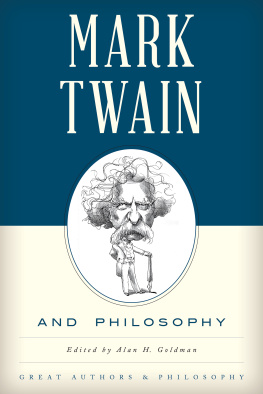
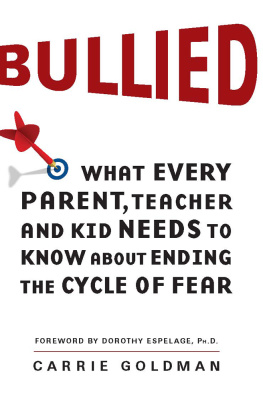
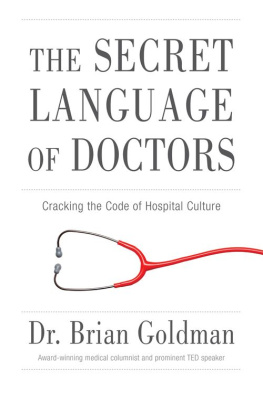

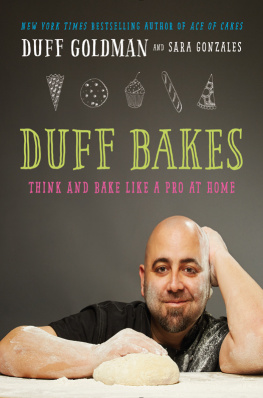
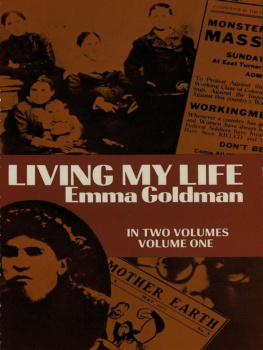
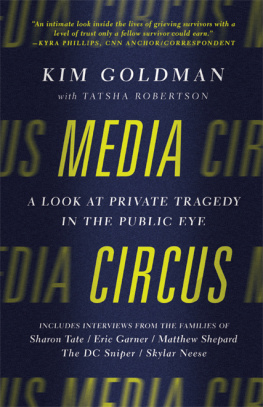

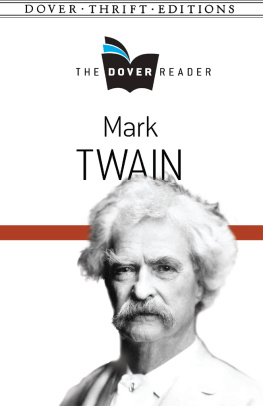

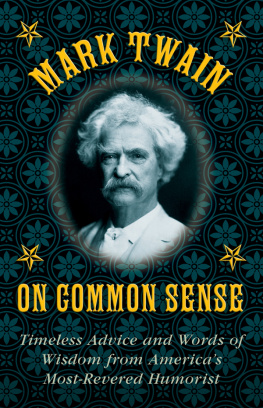

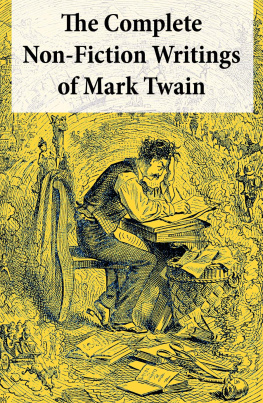
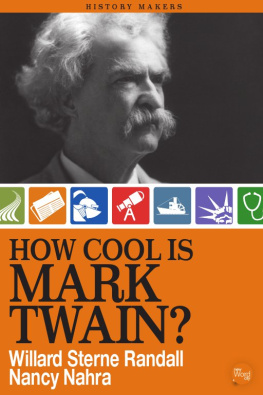
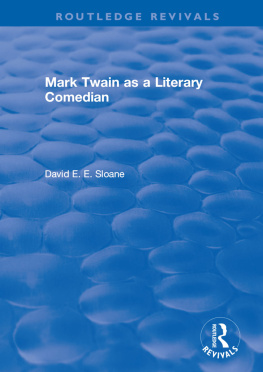
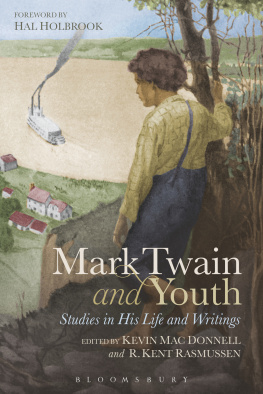
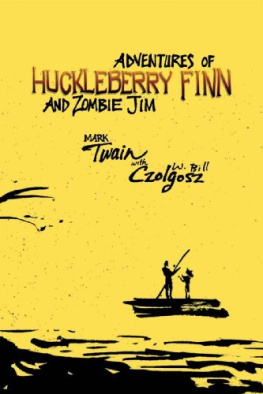
 The paper used in this publication meets the minimum requirements of American National Standard for Information SciencesPermanence of Paper for Printed Library Materials, ANSI/NISO Z39.48-1992.
The paper used in this publication meets the minimum requirements of American National Standard for Information SciencesPermanence of Paper for Printed Library Materials, ANSI/NISO Z39.48-1992.